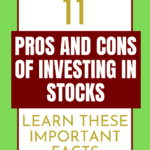THIS POST MAY CONTAIN AFFILIATE LINKS. PLEASE SEE MY DISCLOSURES. FOR MORE INFORMATION.
Investing in stocks is a great way to build wealth for the long term.
But investing in individual stocks is not for everyone.
In this post, I cover the pros and cons investing in stocks.
By the end, you will know if this type of investment is for you, or if there is a better option out there for you.
Table of Contents
11 Meaningful Pros And Cons Of Investing In Stocks
6 Pros Of Investing In Stocks
Putting your money in stocks has many benefits for your long term wealth.
Here are the biggest ones to consider.
#1. Buy The Stocks You Want
One of the best benefits of investing in stocks is you can pick exactly what you want to invest in.
If you want to own a piece of Amazon, you can buy Amazon stock.
You could choose to invest in companies that pay dividends, penny stocks, companies in emerging markets, or other asset classes.
With a mutual fund or an ETF, you can invest in a specific stock, but you will also be buying into in many other companies.
- Read now: Click here to learn the basics of mutual funds
- Read now: Find out what an ETF is and how it works
As a result, not all of your money will be going to the companies you specifically want to buy stock in.
At the end of the day, buying stocks allows you greater control of your investments.
#2. Can Grow Wealth Quickly
Depending on the stocks you buy, you can grow your cash quickly.
While the historical average annual return is 8% for the stock market as a whole, many stocks in a given year can earn a lot more than this.
It is not out of the question to earn 30% or more.
And if you buy into in small companies, you could double your money or more.
This is because they tend to be fast growing companies that can double or triple their revenue in a short period of time.
The result is faster growing stock prices, which means a higher return for you.
Just know that this is more the exception and not the norm.
#3. Beat Inflation
Inflation is the increase in prices over time.
As years pass, your money becomes less valuable.
We see this all time at the grocery store. What a few years ago cost $1.99 not costs $2.99.
- Read now: See how inflation destroys your wealth
Historically, inflation averages around 3% a year.
Unless you are earning this rate of return on your money, you are losing purchasing power.
Since the stock market has an average annualized return of 8%, you can be certain that investing in the stock market will keep you ahead of inflation and you won’t experience a loss of purchasing power.
#4. High Liquidity
Another benefit is their liquidity or how easy it is to sell stocks.
If you need the cash, you can easily sell your stock on an exchange and get the money in a few days time.
This is much faster than if you were to invest in real estate, art, or collectibles, where it could be months or more to find a buyer and close a deal.
#5. Easy To Get Started
Anyone can start stock trading today.
All you need to do is open a brokerage account, transfer money from your checking account, and you are all set.
You don’t need any special training or education.
With that said, you should know the basics of how the stock market works first.
This is because you are putting your money at stake and you can easily lose it.
The easiest way to lower this investment risk is to take some time and learn the basics.
When it comes to your brokerage account, most don’t have and initial investment requirement, so you don’t need thousands of dollars to get started.
Some of the newer brokers allow you to sign up through their mobile app, making getting started even easier.
#6. Low Transaction Costs
Unlike other investment vehicles that charge annual fees, you can trade stocks for close to nothing.
Many online brokers now waive trade commissions on stocks, meaning all your cash goes towards investing.
And the return you earn is 100% yours.
There is no mutual fund or management team taking a fee reducing your returns.
- Read now: See how fees impact your wealth
5 Cons Of Investing In Stocks
As great as stocks are, there are drawbacks investing in stocks.
Here are the ones you need to know about.
#1. Lack Of Diversification
The biggest drawback of investing in stocks is the lack of diversification.
When you buy a stock, all of your money is tied up with it.
If the stock loses value, you lose cash.
With mutual funds or ETFs, you spread out your risk by owning many companies.
So if one company stock drops, chances are your money is still there as the other companies didn’t lose value as well.
#2. Need To Do Research
In order to be successful long term buying stocks, stock investment involves a lot of research and spending time watching the market.
Even if you buy into a well-known company like Amazon, there is still research to be done.
You might think your money is safe, but without research, you don’t see that the upcoming holiday season is expected to be a bad one.
As a result, when Amazon reports earnings, they might come up short and as a result, the share price plummets.
Or just looking at the current stock price doesn’t tell you if now is a good time to invest or if you should wait for a lower share price.
You also need to set target stock prices too.
If you don’t have an exit strategy, you could end up losing money.
The time it takes to not only know the stocks you want to invest in but then also pay attention to them can turn most investors off.
Of course, taking a stock trading course can help you make completing research much easier, saving you time.
#3. Easy To Lose Money
If you don’t do your research, you can easily lose money in the stock market.
But even if you do your research, you can still experience losses.
You never know when a lawsuit might come about or management cannot execute their ideas, or even if investors decide to pull out.
The result is you could lose a significant amount of money through no fault of your own.
#4. Can Be Expensive
When you buy stocks, it can also get very expensive.
Say you want to own 50 shares of a company whose stock is trading at $35 a share.
You need $1,750 just to invest.
If you want to lower your risk by having a well diversified portfolio, you need more cash.
An investment in a mutual fund however would have you buying many other companies for that same $1,750, lowering your risk.
It is important to note that many brokers have recently started to offer fractional shares.
This allows you to buy partial shares of a company.
Going back to the example above, if you only had $1,000 to invest, without fractional shares you could only buy 28 shares.
But with fractional shares, you could buy 28.57 shares.
That extra 0.57 shares might not sound like much, but over time it turns out to matter thanks to compounding.
#5. Emotional Rollercoaster
Finally, investing in the stock market or stocks in general can be an emotional roller coaster.
As the market swings up and down, you are along for the ride.
If you are buying highly volatile stocks, the swings you experience could be even greater.
Add in times like 2000 with the dot com bubble or the financial crisis of 2008, and investing in the stock market gets even crazier.
Final Thoughts
There are the biggest pros and cons of investing in stocks.
While individual stocks are not for everyone, this shouldn’t be an excuse as to why you shouldn’t make an investment.
There are many other investment vehicles to choose from, including mutual funds and exchange traded funds.
Also, don’t overlook robo-advisors.
These brokers will do all the work for you.
Just answer a few basics questions and set up a monthly investment and sit back and let your money grow.
At the end of the day, putting your money into stocks is a great way to reach your financial goals.
You just have to make sure have a well diversified portfolio to lower risk and a plan for buying and selling.
- Read now: Discover how to become a stock market millionaire
- Read now: Learn how to rebalance your portfolio
- Read now: Click here for 109 incredible Warren Buffett quotes
I have over 15 years experience in the financial services industry and 20 years investing in the stock market. I have both my undergrad and graduate degrees in Finance, and am FINRA Series 65 licensed and have a Certificate in Financial Planning.
Visit my About Me page to learn more about me and why I am your trusted personal finance expert.



